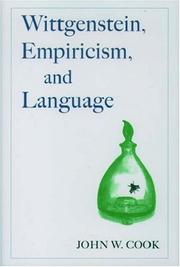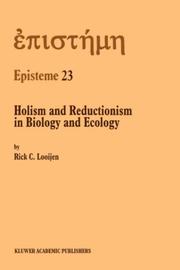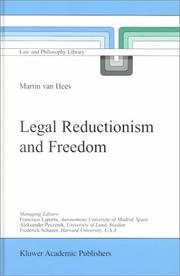| Listing 1 - 3 of 3 |
Sort by
|

ISBN: 019513298X 0195343999 1280472952 0585364737 9780585364735 9780195132984 9781280472954 9780195343991 019773197X Year: 2000 Publisher: New York: Oxford university press,
Abstract | Keywords | Export | Availability | Bookmark
 Loading...
Loading...Choose an application
- Reference Manager
- EndNote
- RefWorks (Direct export to RefWorks)
John W. Cook demonstrates how Wittgenstein's philosophical views have been misunderstood, including the failure to recognize the reductionist character of Wittgenstein's work and the unacknowledged influence of Russell.
Reductionism --- Reductionisme --- Reductionnisme --- -Reductionism --- Language and languages --- Philosophy --- Wittgenstein, Ludwig, --- Wittgenstein, Ludwig --- Wittgenstein, Ludwig, - 1889-1951. --- Wei-tʻe-ken-ssu-tʻan, --- Wei-tʻe-ken-ssu-tʻan, Lu-te-wei-hsi, --- Wittgenstein, L. --- Vitgenshteĭn, L., --- Wei-ken-ssu-tʻan, --- Pitʻŭgensyutʻain, --- Vitgenshteĭn, Li︠u︡dvig, --- Weitegenshitan, --- Wittgenstein, Ludovicus, --- Vitgenshtaĭn, Ludvig, --- ויטגנשטיין, לודוויג --- 维特根斯坦, --- Wittgenstein, Ludwig Josef Johann, --- Reductionism. --- Philosophy. --- Language and languages - Philosophy --- Wittgenstein, Ludwig, - 1889-1951

ISBN: 0792360761 9048153646 9401595607 Year: 2000 Volume: 23 Publisher: Groningen Rijksuniversiteit
Abstract | Keywords | Export | Availability | Bookmark
 Loading...
Loading...Choose an application
- Reference Manager
- EndNote
- RefWorks (Direct export to RefWorks)
Holism and reductionism are traditionally seen as incompatible views or approaches to nature. Here Looijen argues that they should rather be seen as mutually dependent and hence co-operating research programmes. He sheds some interesting new light on the emergence thesis, its relation to the reduction thesis, and on the role and status of functional explanations in biology. He discusses several examples of reduction in both biology and ecology, showing the mutual dependence of holistic and reductionist research programmes. Ecologists are offered separate chapters, clarifying some major, yet highly and controversial ecological concepts, such as `community', `habitat', and `niche'. The book is the first in-depth study of the philosophy of ecology. Readership: Specialists in the philosophy of science, especially the philosophy of biology, biologists and ecologists interested in the philosophy of their discipline. Also of interest to other scientists concerned with the holism-reductionism issue.
Biology --- Philosophy of science --- Holism --- Holisme --- Reductionism --- Reductionisme --- Reductionnisme --- Wholism --- -Ecology --- -Holism --- Philosophy --- Evolution --- Whole and parts (Philosophy) --- Balance of nature --- Bionomics --- Ecological processes --- Ecological science --- Ecological sciences --- Environment --- Environmental biology --- Oecology --- Environmental sciences --- Population biology --- Life sciences --- Biomass --- Life (Biology) --- Natural history --- Ecology --- Holism. --- Reductionism. --- Philosophy. --- Vitalism --- Ecophilosophy --- Biology—Philosophy. --- Philosophy and science. --- Evolutionary biology. --- Plant ecology. --- Ecology . --- Philosophy of Biology. --- Philosophy of Science. --- Evolutionary Biology. --- Plant Ecology. --- Ecology. --- Botany --- Phytoecology --- Plants --- Vegetation ecology --- Animal evolution --- Animals --- Biological evolution --- Darwinism --- Evolutionary biology --- Evolutionary science --- Origin of species --- Biological fitness --- Homoplasy --- Natural selection --- Phylogeny --- Science and philosophy --- Science --- Floristic ecology

ISBN: 0792364910 1402002858 9401094535 Year: 2000 Publisher: Dordrecht Kluwer
Abstract | Keywords | Export | Availability | Bookmark
 Loading...
Loading...Choose an application
- Reference Manager
- EndNote
- RefWorks (Direct export to RefWorks)
Martin van Hees presents a new approach to the study of law - legal reductionism - which combines elements of legal positivism, new institutionalism and decision theory. From legal positivism Van Hees derives some fundamental insights into the nature of legal systems, but he also revises some of its key tenets. He argues that law can be reduced to facts; moreover, he re-establishes the relation between law and morality by arguing that law and positive morality are inherently related. He subsequently uses decision-theoretic tools to develop and defend his reductionist methodology. The second part of the study applies the resulting approach to an analysis of legal freedom. By showing that legal reductionism allows us to analyse the value of liberal legal systems, Van Hees makes a forceful case for including the study of law in moral and political philosophy. The book is accessible to a wide readership, including legal and moral philosophers, political theorists and social scientists.
Legal theory and methods. Philosophy of law --- Legal positivism. --- Reductionism. --- Political science. --- Microeconomics. --- Philosophy. --- Science education. --- Political philosophy. --- Philosophy of Law. --- Philosophy, general. --- Science Education. --- Political Philosophy. --- Political philosophy --- Science education --- Scientific education --- Mental philosophy --- Humanities --- Price theory --- Economics --- Administration --- Civil government --- Commonwealth, The --- Government --- Political theory --- Political thought --- Politics --- Science, Political --- Social sciences --- State, The
| Listing 1 - 3 of 3 |
Sort by
|

 Search
Search Feedback
Feedback About UniCat
About UniCat  Help
Help News
News